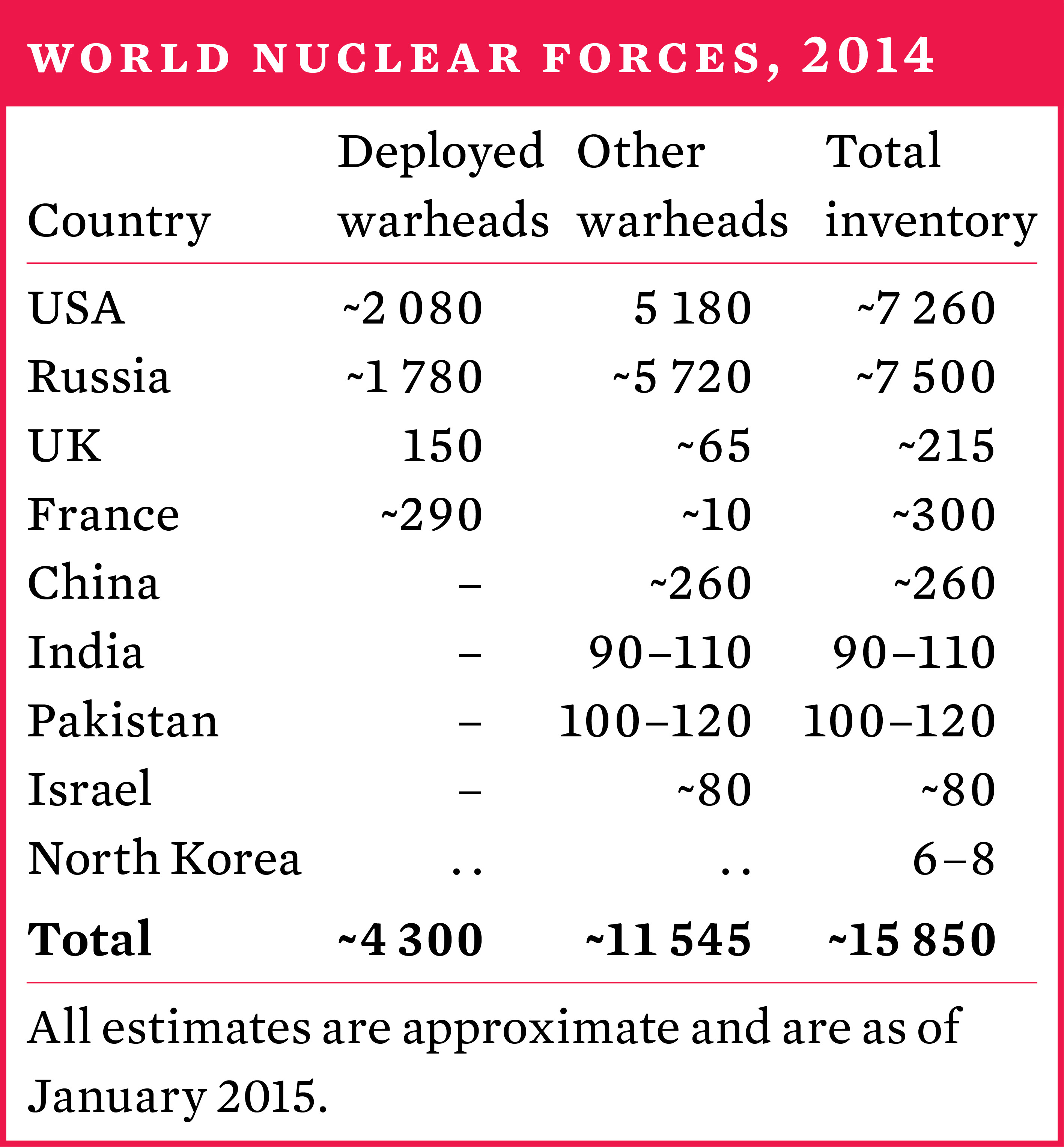11. World nuclear forces
Overview [PDF]
I. US nuclear forces [PDF]
II. Russian nuclear forces [PDF]
III. British nuclear forces [PDF]
IV. French nuclear forces [PDF]
V. Chinese nuclear forces [PDF]
VI. Indian nuclear forces [PDF]
VII. Pakistani nuclear forces [PDF]
VIII. Israeli nuclear forces [PDF]
IX. North Korea’s military nuclear capabilities [PDF]
X. Global stocks and production of fissile materials, 2014 [PDF]
Summary
At the start of 2015, nine states—the United States, Russia, the United Kingdom, France, China, India, Pakistan, Israel and the Democratic People’s Republic of Korea (DPRK, or North Korea)—possessed approximately 15 850 nuclear weapons, of which 4300 were deployed with operational forces. Roughly 1800 of these weapons are kept in a state of high operational alert.
Nuclear arsenals
The total number of nuclear warheads in the world is declining, primarily due to Russia and the USA continuing to reduce their nuclear arsenals. Together, their arsenals account for more than 90 per cent of global inventories of nuclear weapons. The pace of reductions appears to be slowing compared with a decade ago, however, and neither country has made substantial cuts in its deployed strategic nuclear forces since bilaterally agreeing the 2010 Treaty on Measures for the Further Reduction and Limitation of Strategic Offensive Arms (New START). At the same time, both Russia and the USA have extensive and expensive modernization programmes under way for their nuclear delivery systems, warheads and production facilities.
The other legally recognized nuclear weapon states, as defined by the 1968 Treaty on the Non-Proliferation of Nuclear Weapons (Non-Proliferation Treaty, NPT)—China, France, Russia, and the UK—are either developing or deploying new weapon systems or have announced their intention to do so. In the case of China, this may involve a modest increase in the size of its nuclear weapon inventory. All five legally recognized nuclear weapon states appear determined to retain their nuclear arsenals indefinitely.
The nuclear arsenals of the other nuclear-armed states are considerably smaller. However, India and Pakistan are both expanding their nuclear weapon stockpiles as well as their missile delivery capabilities, while Israel is testing a new long-range nuclear-capable ballistic missile. A ninth state—North Korea—appears to be improving its military nuclear capability, but it is not known whether it has developed a nuclear warhead that can be carried by a ballistic missile.

Transparency: a mixed picture
The existence of reliable information on the status of the nuclear arsenals and capabilities of the nuclear-armed states varies considerably. The USA has disclosed substantial information about its stockpile and forces, and the UK and France have also declared some information. Even though it shares such information with the USA, Russia does not otherwise disclose the detailed breakdown of its strategic nuclear forces counted under New START. The US Government has stopped publishing detailed information about Russian and Chinese nuclear forces. China remains highly non-transparent, and little information is publicly available about its nuclear forces and weapon production complex. The governments of India and Pakistan make statements about some of their missile tests but provide no information about the status or size of their respective arsenals. Israel has a policy of not commenting on its nuclear arsenal and North Korea provides no public information about its nuclear capabilities.
Stocks of fissile materials
Materials that can sustain an explosive fission chain reaction are essential for all types of nuclear explosive, from first-generation fission weapons to advanced thermonuclear weapons. The most common of these fissile materials are highly enriched uranium (HEU) and plutonium.
For their nuclear weapons, China, France, Russia, the UK and the USA have produced both HEU and plutonium; India, Israel and North Korea have produced mainly plutonium; and Pakistan is moving from mainly HEU to plutonium weapons. All states with a civilian nuclear enrichment or reprocessing industry have some capability to produce fissile materials for weapons.
The International Panel on Fissile Materials compiles information on global stocks of fissile materials.
Global stocks of fissile materials, 2014
Highly enriched uranium: ~1345 tonnes
Separated plutonium:
Military stocks: ~223 tonnes
Civilian stocks: ~270 tonnes